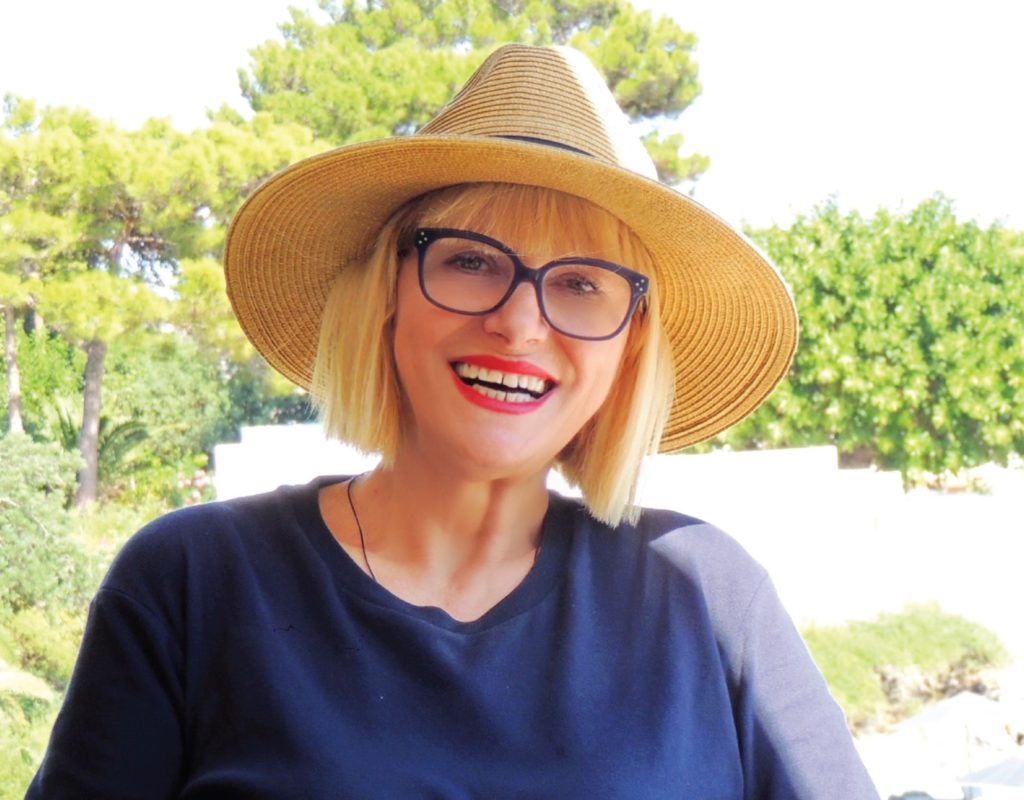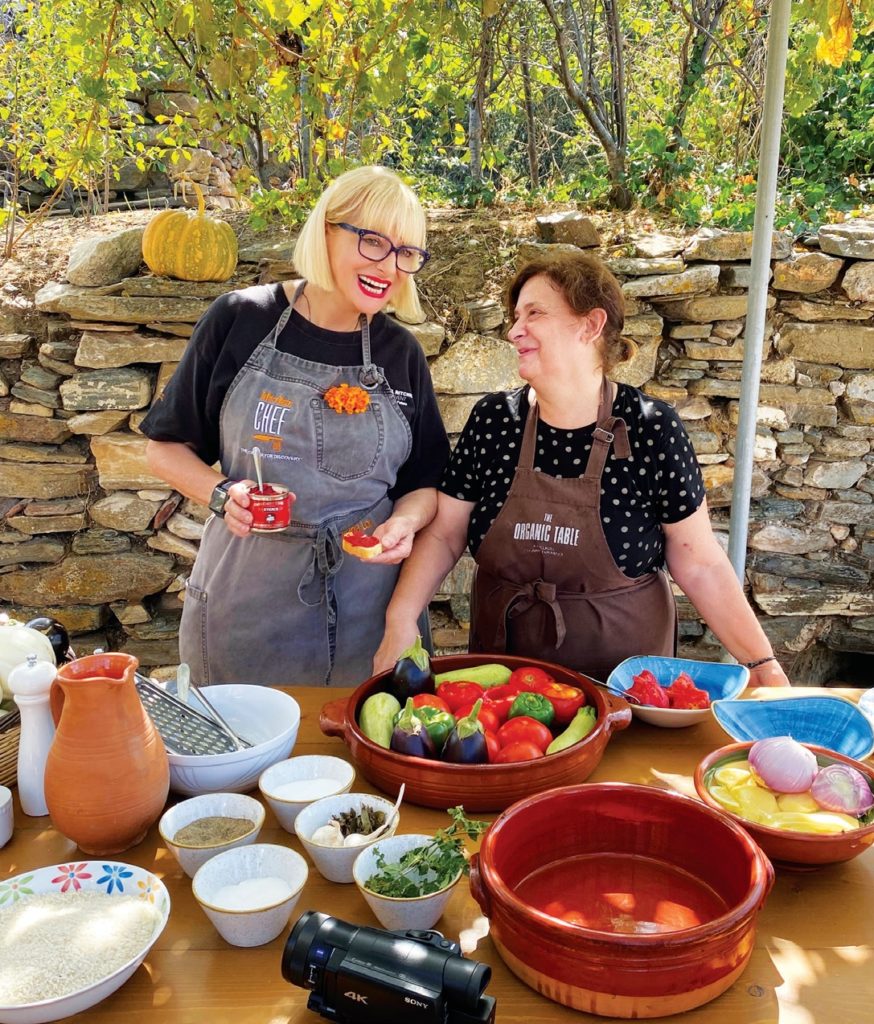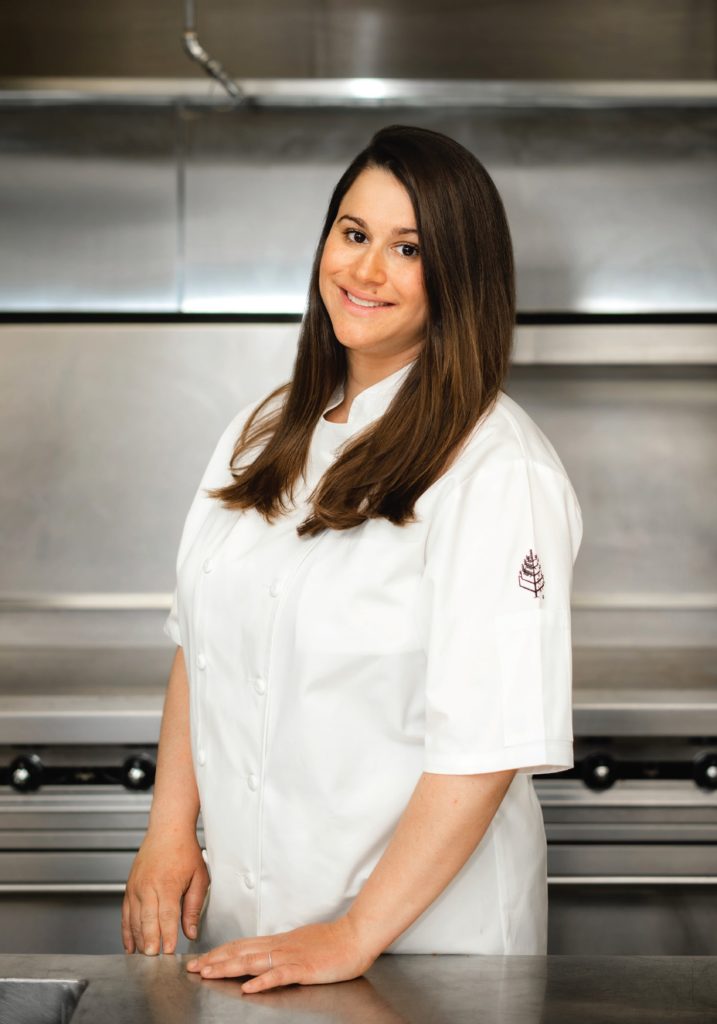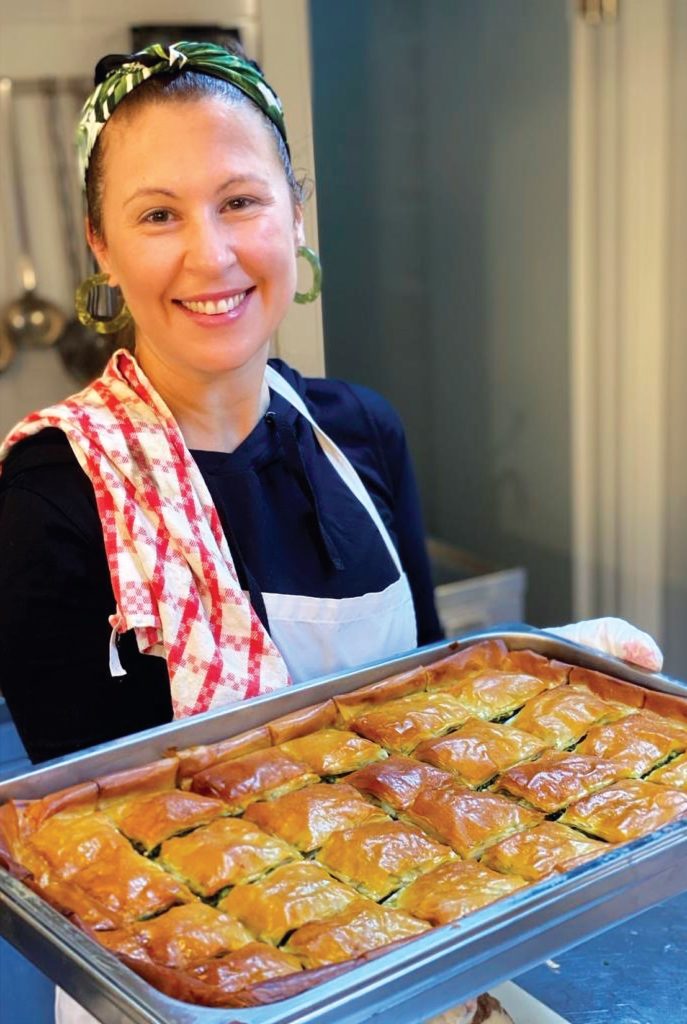Power Chefs
Posted by estiator at 11 September, at 14 : 32 PM Print
COVER STORY
Meet three women at the top of their game in the kitchen and beyond.
By Michael Kaminer


Chef Maria Loi 
Maria Tampakis 
Christina Xenos
It seems almost quaint to bring up gender in our industry. But only a quarter of chefs in the U.S. are female, according to recent data. And as recent reckonings around bad behavior have proved, restaurants haven’t always been comfortable environments for women.•With that in mind, Estiator sought out three top Greek female chefs who are conquering the culinary world. They’ve all come at it from different angles: One harnesses her global profile to champion Greek food and healthful lifestyle choices. Another is a private chef whose grit propelled her business through the pandemic. And a third reached the top of the mountain in a leadership role at a major New York hotel.• In their experiences and insight, there’s a lot to learn about food, work—and life.
Chef Maria Loi, New York
Restaurateur, entrepreneur, culinary ambassador
A longtime champion of Greek cuisine and the Mediterranean diet, Chef Maria Loi has parlayed her love of food into a global enterprise. An award-winning author and television personality, she oversees a popular line of branded food products, created a cookware collection, has penned 36 cookbooks, and even cooked for presidents. Her restaurants, Loi Estatorio in New York and Kouzina Loi Nafpaktos in Nafpaktos, generate rapturous reviews. As an educator, Chef Loi has advocated for plant-based diets to lead “food evolution” through the coming decade. Estiator caught up with her in Greece, where she was shooting a new TV series.
Your site says your food is about “truth in flavor.” What does that mean to you?
It means honoring the ingredients in dishes, and allowing their best qualities to shine by relying on the simplicity of method. Every ingredient has a purpose and a place, and each step of the culinary process is there for a reason. If your grandmother wouldn’t recognize it, don’t use it or do it!
Many women have written about their experiences as chefs, from Alice Waters to Gabrielle Hamilton. In your career, has being a woman been a plus, a minus, or not relevant?
While I do know that there are distinctions made between chefs and female chefs, in my experience, this difference has not been relevant to me. I am thankful that my colleagues treat me as a chef, not a “female chef,” and respect me for my food, my work, and my work ethic. I choose to do the same—to see the person for who they are, and what they do, not their gender.
You’re now running a global business. What’s a typical day like, if there is such thing as a typical day?
There’s no such thing as a typical day—and I love it! One day I will be filming for my PBS show, The Life of Loi; another day I will be in the kitchen testing recipes for my new book, and on another day, I may be on back to back Zooms with Greece dealing with our Loi Food Products lines and working on new SKUs. There’s never a dull moment!
Are you optimistic about dining and hospitality as we emerge from the pandemic?
I am very optimistic person in general, so I know that moving forward toward whatever the post-pandemic world looks like, there is space for in-person dining, takeout, delivery, and everything in between. Humans enjoy indulging in the service-related elements of hospitality, and people in our industry are passionate about providing amazing customer experiences—the two go hand-in-hand. Of course, we live in the information age, where instant gratification is normal, so delivery apps are here to stay because they expand the ability and reach of different types of cuisines to a wider customer base.
What’s your advice to restaurateurs who are starting out—or even to longtime operators who might be struggling? What’s the most important thing you’ve learned about growing a successful business?
Never give up. You have to be prepared no matter what. There are going to be good days and hard days, but regardless, it’s important to remember your passion for service and hospitality, and remain dedicated to your craft. When you love what you do, and work hard at it, success will follow.
You famously got your NYC staff to lose weight on a diet you designed. How would you encourage Americans to change the way they eat?
Cut out the processed foods! Eat more greens, beans, and olive oil! Enjoy your food—put down the phone, close the computer, turn off the TV, and experience all the flavors and textures of what you’re eating. And teach your children these same values; these simple things can make a huge difference in your life, and you will see how the world will change!
What’s on tap for Chef Loi in 2022?
The sky isn’t even the limit! A big expansion of Loi Food Products’ lines, some very exciting culinary projects, and filming for my PBS series, The Life of Loi! And of course, continuing my philanthropic work with the Loukoumi Make a Difference Foundation, The Floating Hospital, and The Center for Discovery—together we can change the world, one heathy bite at a time!
Along with the ancient Greeks named on your site, who are your own kitchen heroes or heroines? Who has influenced you the most?
The phrase “It takes a village…” is the reality of how I was raised, influenced, and inspired culinarily. In the village where I grew up, I learned from my aunts, my grandmother, my cousins, and my neighbors all about ingredients, as well as different dishes, techniques, and methods, which have stayed with me my whole life. However, the two people from whom I learned the most, who inspired and influenced me above others, were my papou and my father—they were my true culinary heroes. And though my mother was not the best cook, she made the world’s best yogurt, which is how I learned to make my Loi Greek Yogurt that I serve at Loi Estiatorio today!

Chef Maria Tampakis, New York
Executive Chef, Four Seasons Hotel New York Downtown
It takes a lot to shine next to kitchen legends like Gordon Ramsay, Jean-Georges Vongerichten, and Heston Blumenthal. But in a globe-trotting, decade-long career, Chef Maria Tampakis has been a quiet force in some of the world’s most influential restaurants. Now she’s at another career peak, overseeing menus and culinary experiences at the luxurious Four Seasons Hotel New York Downtown. Estiator spoke to the busy chef from her bustling office inside the property.
You took on a huge job in April as executive chef of the Four Seasons New York Downtown. What does your day-to-day look like?
I oversee all food and beverage operations, from the culinary side, for the property. That includes the rooms and residences, spa, in-room dining, and welcome programs. When I joined, the plan was changing the entire in-room dining menu, which had been in place for a while. I’m shaking things up a bit, bringing in seasonality and new life.
How does the hotel environment differ from restaurant kitchens, where you spent much of your career?
It’s completely different from the restaurant environment. Restaurants are ultrafast, and really busy. You might have 400, 500 covers for a service. If you see something’s not selling, you change it up and sell it as a special. And if you’re running a restaurant in New York, you’re dealing with the city and the unions. In a hotel, every day is different. You might have an occupancy of 20%, but you might get hit with 100 breakfast orders. One of the residents might call down because they want some fruit. The Four Seasons brand standard is that we never say no. It’s a different atmosphere, environment, and mindset.
After so many years of working with other chefs, what’s it like working for a company like The Four Seasons?
The Four Seasons team is incredible. I’ve never worked for a company that’s so much about “What do you think? How do you see this?” It’s very rewarding. The guys in the kitchen are all talented and capable. And the general manager has been incredible, too. He wants me to bring in my own style and break away from the norm of the last few years. I’ll bring in 10 dishes; he’ll love five of them, hate two, and want to discuss the other three.

Has being a woman had any effect on the direction of your career?
Being young and female in London, and being American, I stuck out like a sore thumb. But it forced me to make a name for myself. England is hard place to work. There’s a different expectancy around the workweek and pay structure. But I’ve always thrown myself into the best kitchens and worked for the best chefs. My mother is in the industry, and she always said I’d never make a name working in places that are small and local. So I told myself I was going to run to the best of the best. I started at Jean-Georges—you have to hold your ground in that kind of kitchen. You work for it.
You spent years in London working with the famously exacting Gordon Ramsay. What was that experience like?
I worked for the Gordon Ramsay Group. Those kitchens were my hardest years, and some of the toughest places, but I wouldn’t change them for anything. Eventually, I traveled with him to events and appearances, helped him set up, made sure the menus were accurate. It was a good relationship. When it was time to go, it was time to go. I was burnt out. It really tests you when you’re on day 17 of an 18-day run.
You’re New York-born, but your family’s Greek roots are strong. What’s the connection to Greece like now?
I grew up in a big Greek household in Brooklyn, and I’m fluent in Greek. We’ve always maintained incredibly strong ties to Greece and Greek culture; my family has a house in Greece where we spend time every summer. I went to the same Greek elementary school in downtown Brooklyn that my father went to. And I’m still chair of the school’s annual Greek festival. My heritage encompasses who I am. I grew up with a grandmother who cooked for 30 or 40 people without blinking. You’d go to her house at nine in the morning and you’d see green beans in the oven and things proofing. We always had people coming through our house, so family dinners for 30 or 40 were not abnormal. It was about “Oh, you don’t have anywhere to go for this holiday? Come over.”
How do you define the culinary style you’re bringing into The Four Seasons?
It’s a blend of the Mediterranean lifestyle and the modern-European cooking I did for several years. It’s about really fresh ingredients where you just highlight the ingredients. If it’s a beautiful piece of fish, maybe you’ll plate it with some lemon and highlight the few ingredients that are on the plate. We’re trying to keep things light and fresh, and vegetable-forward.
Your mother, Michelle, is a culinary instructor who ran a gluten-free bakery in New York. Did you ever want to open your own place?
I saw my mother’s struggles running a bakery in New York City. Between the costs and the staffing, I felt for her; Covid eventually closed the business. I know my goals, and I would rather run someone else’s business successfully. What’s your advice to restaurateurs at such a challenging time? Stick to your guns, stay true to yourself, strip away everything that’s unnecessary, and do what you do best. Don’t complicate things. And don’t allow negativity to affect you. People are so cooped up that they don’t have any filter. Covid has brought out the worst in patrons. You fall short for a second, they say they’re never coming back. Why do people need to do that?
Chef Christina Xenos, Los Angeles
My Sweet Greek Personal Chef Services
Christina Xenos wears many toques. As the only personal chef in Los Angeles with a Greek focus, she runs My Sweet Greek, a busy meal-prep and food-event business. As an author, she is the co-author of Opa! The Healthy Greek Cookbook. And as an educator, she develops recipes and hosts popular cooking classes that range from classic to boundary-breaking. Estiator spoke to her from New York, where she had stopped overnight on a food-themed trip to Greece.
What was your path to a culinary career?
I always wanted to become a chef. But when I graduated high school in the late ’90s, the job wasn’t as glamorous as it is now—there wasn’t the cult of celebrity chefs. My parents were against culinary school. My grandparents were Greek immigrants, and my parents wanted us to go to college. So I went to Ohio University and majored in journalism. For more than a decade, I was the Digital Editor for WHERE Magazine in Los Angeles. I covered restaurants and talked to chefs, which reignited my love of food and cooking. I finally went to culinary school in 2014 and started my business in 2015. And I got to marry my love of cooking and writing with Opa! The Healthy Greek Cookbook in 2017.
How has the pandemic affected your business?
This has been my busiest year ever so far. People are sick of cooking for themselves. Being stuck at home and in charge of making all their meals, grocery shopping, and home-schooling kids, all while juggling their work, was a huge stress. After doing that, I think they realized the value of enlisting a personal chef to take care meal planning, shopping, and cooking. The summer of 2020 was particularly busy. Most people couldn’t travel to Greece, so they enlisted me to bring a Greek island experience to their small private parties. But last year’s lockdowns were really tricky. You couldn’t adequately shop for groceries, and people wouldn’t let you in their homes. Pre-Covid, I’d had clients and classes lined up, and that was all shot.
What’s the focus of your menus for events or for chefprepared meals?
Some of it is Greek, and some are hybrids. I’m hosting a Greek/Mexican fusion dinner in September, with dishes like “Greekamole,” tequila saganaki, and chipotle feta. I also have clients who are from Egypt. The cuisines are similar, like a lot of Mediterranean cuisines. For a party, I did a Greek fish preparation with an Egyptian rice dish.
Your family came to the U.S. in the early 1900s. Where are your roots?
My maternal grandfather is from Milos, and my mother’s mother came from Sparta. My paternal grandparents both came from Crete. Both sides emigrated to Chicago. My yiayias lived with us. The one from Crete didn’t even speak English, so we spoke a lot of Greek at home, or Greeklish with my parents. My mother cooked classic Greek dishes on holidays, which inspired me to learn the recipes. One of my yiayias also had a big garden with grape leaves in the backyard. We’d pick them and make dolmades together.
What’s the Chef Xenos spin on Greek food?
You don’t need to improve on Greek food. All Greek cuisine is healthy, and we eat things in moderation. I do lighten things up, by baking instead of frying, for example.

What do you think Greek restaurants should do to evolve?
Diversify their menus. It gets boring to see the same five things on the menu. I want people to discover that Greek food is more than moussaka and pasticcio. There’s such a wealth and range of food, and I wish restaurants would get more creative. I love going to Greece to find new recipes and share them. I evangelize Greek food.
Has being a woman been a factor in your career or your growth?
Being a woman has brought tremendous opportunities. For example, I’m a member of [group of women culinary leaders] Les Dames D’Escoffier. When [famed Greek chef] Argiro Barbarigou came to the U.S. to cook at the James Beard house, she wanted Les Dames chefs to join her, and I was one of six who did. In my day-to-day, people think I’m younger than I am, so I’ve been questioned on things. So you have to show you’re an authority in the kitchen. But that may not be a gender thing.
















